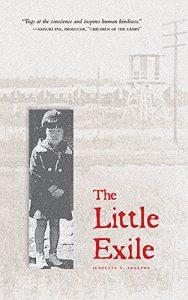JQ Magazine: Book Review — ‘The Little Exile’

“The Little Exile reveals a world of angst, but hope in a world that has been turned upside down.” (Stone Bridge Press)
By Rashaad Jorden (Yamagata-ken, 2008-10) for JQ magazine. A former head of the JETAA Philadelphia Sub-Chapter, Rashaad is a graduate of Leeds Beckett University with a master’s degree in responsible tourism management. For more on his life abroad and enthusiasm for taiko drumming, visit his blog at www.gettingpounded.wordpress.com.
Earlier this year I explored Uprooted, an exhibition devoted to the Japanese American internment. Considering how many families were displaced following Pearl Harbor, “uprooted” is at the perfect word to describe how a lot of people’s lives were disrupted.
Uprooted also comes to mind when reading The Little Exile. Written by Jeanette Arakawa, the novel tells the story of Marie Mitsui, a Japanese American girl living in San Francisco, whose world is jolted after the events of December 7, 1941 as she and her family is forced to relocate to an internment camp in Arkansas. Based on her own life story (although some names in the book have been changed), Arakawa takes readers on a journey through the brutal challenges that many Japanese Americans faced.
At first, you might think that The Little Exile is an uneventful novel, as the first few chapters capture a seemingly carefree life that the Mitsuis enjoy (Marie has an older brother named Brian). They seem to be a typical American family—Marie’s parents run a dry cleaning shop where the whole family lives. She loves roller-skating with her friend Beverly and often spends time on the playground (She frequently wins amateur hour contests there).
However, San Francisco is not paradise for the Mitsuis—Brian learns from his father that due to “racial covenants,” the family is prohibited from buying houses in a certain neighborhood. In addition, classmates hurl racial slurs at Brian and Marie upon their arrival at the Lawton School in December 1940.
Things only get worse in December of the following year: Papa mentions to Brian that residents of Japantown are pelted with eggs and tomatoes. While authorities were harassing members of the community, you feel the immediate fear that Marie and many others in the community feel after Pearl Harbor. Of course, it probably isn’t a surprise that many Japanese Americans felt an immense sense of dread following Pearl Harbor, but Arakawa’s storytelling might introduce you to aspects of the Japanese American experience you might not have known about, such as the Mitsuis being placed under house arrest.
While at times there is a sense that The Little Exile may be lacking in some information about aspects of the Japanese American internment like Executive Order 9066, Arakawa definitely put some major events of World War II in the context of her personal life. When President Roosevelt announced restrictions on where “both aliens and non-aliens of Japanese ancestry” could live, that meant the Mitsuis had to move to Stockton, where they had family. In addition, when it was apparent that victory in Asia was inevitable, that meant that the Mitsuis would be leaving their camp.
Indeed, more important that the hard historical anecdotes, The Little Exile conveys how emotional that period was for Arakawa. Anyone somewhat knowledgeable about the Japanese American internment probably realizes how grim that period that was for many people, which comes to life in the book. Not only are the Mitsuis assigned to one room in the barracks, but they ceased to exist in a sense: Arakawa wrote about no longer being Marie Mitsui as the government was concerned, but “a number,” as a number was her primary sense of identification.
Being an in-depth look at life in an internment camp, Arakawa takes you into a world that you might be unfamiliar with. Some of this world’s well-known aspects may at first seem unsurprising to the reader, such as arguments that become common knowledge to everyone in the camp due “everyone having ears to our walls,” as the author puts it. But The Little Exile does grab attention—you might be surprised at some parts of life in the internment camps, such as the internees actually being entertained (Marie’s father was part of the department that provided entertainment to the people in the camp). It seems strange that the government would provide such a service, but it happened.
There are no pictures in The Little Exile, so those reading about the Mitsuis life will have to visualize their world in their heads. Fortunately, the author provides more than enough information to do so. The Little Exile reveals a world of angst, but hope in a world that has been turned upside down.
For more on The Little Exile, click here.
For more JQ magazine book reviews, click here.


Comments are closed.